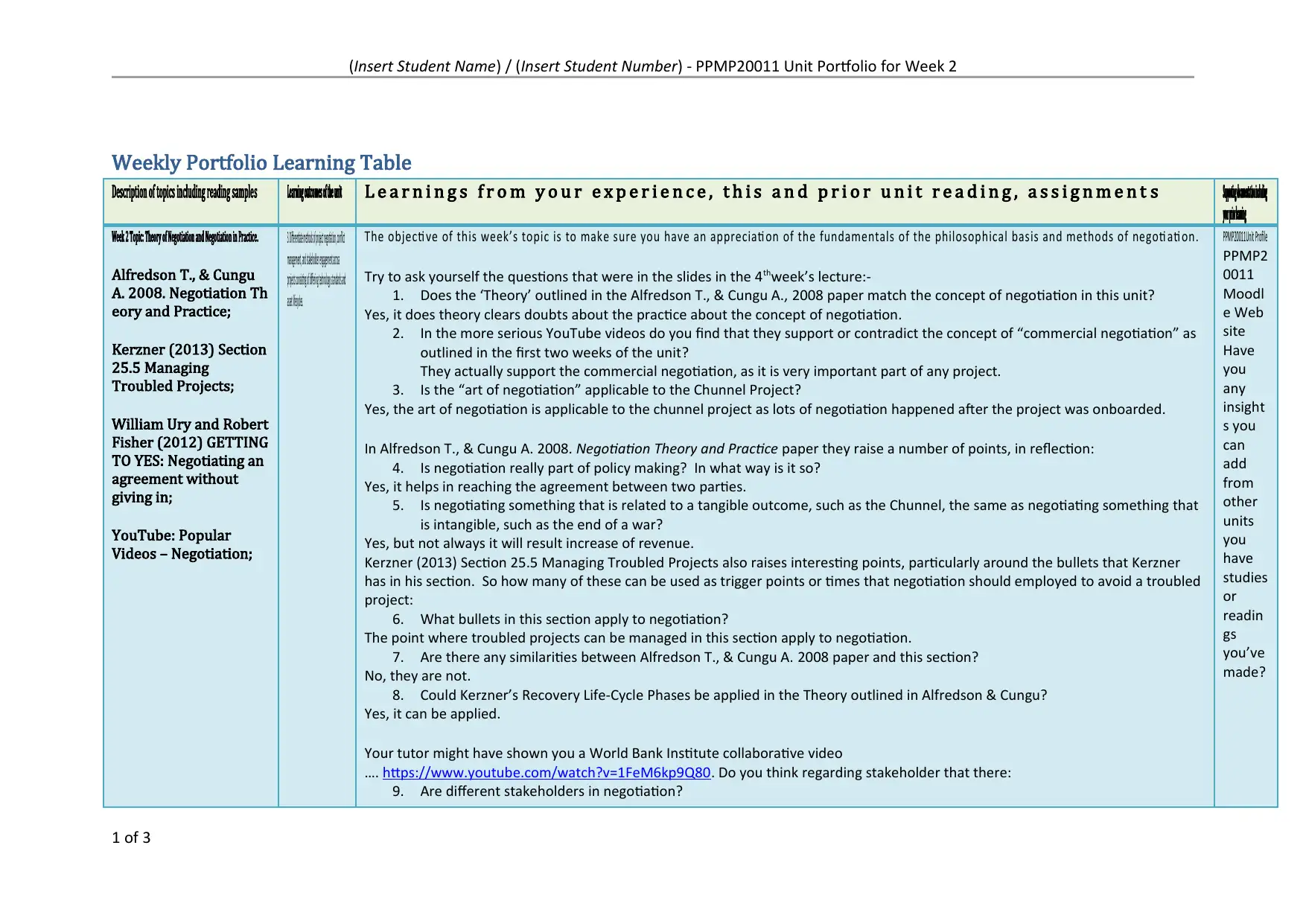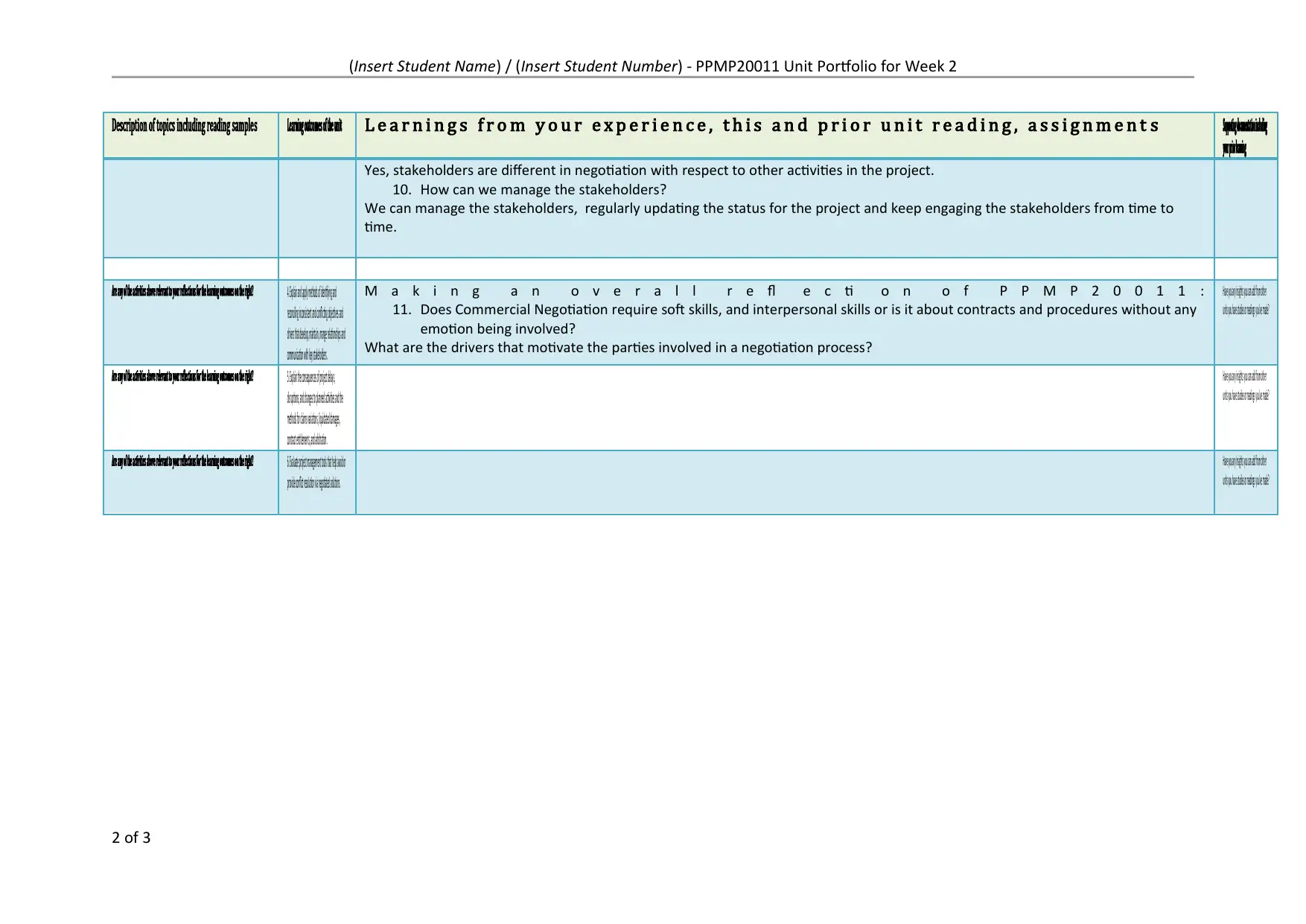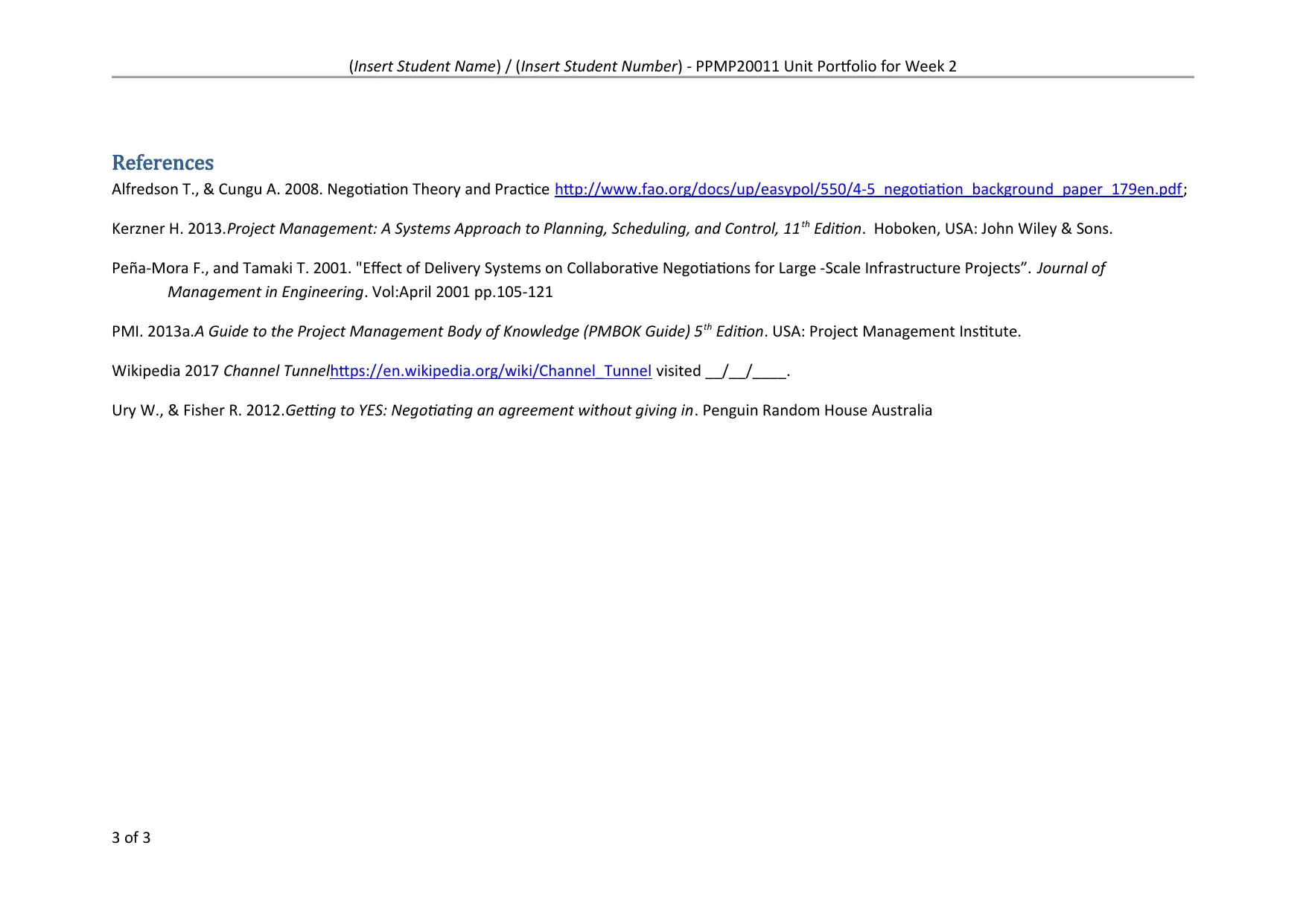PPMP20011: Unit Portfolio - Week 2: Theory of Negotiation and Practice
VerifiedAdded on 2021/05/31
|3
|1009
|28
Homework Assignment
AI Summary
This portfolio assignment for PPMP20011 focuses on the theory and practice of negotiation within project management. It analyzes the philosophical basis of negotiation, comparing academic theories with practical applications. The assignment explores methods of project negotiation, conflict management, and stakeholder engagement, considering different project types and lifecycles. It examines the applicability of negotiation principles to real-world scenarios, such as the Chunnel project, and the role of negotiation in policy-making. The portfolio also delves into the impact of project delays and disruptions, discussing methods for claims, variations, and contract entitlements. The student reflects on learning outcomes, referencing readings from Alfredson & Cungu, Kerzner, and other sources to demonstrate an understanding of negotiation's role in project success and stakeholder management. Furthermore, it addresses the importance of soft skills, drivers in negotiation processes and project management tools to avoid conflict.

(Insert Student Name) / (Insert Student Number) - PPMP20011 Unit Portfolio for Week 2
Weekly Portfolio Learning Table
Description of topics including reading samples Learning outcomes of the unit L e a r n i n g s f r o m y o u r e x p e r i e n c e , t h i s a n d p r i o r u n i t r e a d i n g , a s s i g n m e n t s Supporting documentation including
your prior learning
Week 2 Topic: Theory of Negotiation and Negotiation in Practice.
Alfredson T., & Cungu
A. 2008. Negotiation Th
eory and Practice;
Kerzner (2013) Section
25.5 Managing
Troubled Projects;
William Ury and Robert
Fisher (2012) GETTING
TO YES: Negotiating an
agreement without
giving in;
YouTube: Popular
Videos – Negotiation;
3. Differentiate methods of project negotiation, conflict
management, and stakeholder engagement across
projects consisting of differing technology standards and
asset lifecycles.
The objecti ve of this week’s topic is to make sure you have an appreciati on of the fundamentals of the philosophical basis and methods of negoti ati on.
Try to ask yourself the questions that were in the slides in the 4thweek’s lecture:-
1. Does the ‘Theory’ outlined in the Alfredson T., & Cungu A., 2008 paper match the concept of negotiation in this unit?
Yes, it does theory clears doubts about the practice about the concept of negotiation.
2. In the more serious YouTube videos do you find that they support or contradict the concept of “commercial negotiation” as
outlined in the first two weeks of the unit?
They actually support the commercial negotiation, as it is very important part of any project.
3. Is the “art of negotiation” applicable to the Chunnel Project?
Yes, the art of negotiation is applicable to the chunnel project as lots of negotiation happened after the project was onboarded.
In Alfredson T., & Cungu A. 2008. Negotiation Theory and Practice paper they raise a number of points, in reflection:
4. Is negotiation really part of policy making? In what way is it so?
Yes, it helps in reaching the agreement between two parties.
5. Is negotiating something that is related to a tangible outcome, such as the Chunnel, the same as negotiating something that
is intangible, such as the end of a war?
Yes, but not always it will result increase of revenue.
Kerzner (2013) Section 25.5 Managing Troubled Projects also raises interesting points, particularly around the bullets that Kerzner
has in his section. So how many of these can be used as trigger points or times that negotiation should employed to avoid a troubled
project:
6. What bullets in this section apply to negotiation?
The point where troubled projects can be managed in this section apply to negotiation.
7. Are there any similarities between Alfredson T., & Cungu A. 2008 paper and this section?
No, they are not.
8. Could Kerzner’s Recovery Life-Cycle Phases be applied in the Theory outlined in Alfredson & Cungu?
Yes, it can be applied.
Your tutor might have shown you a World Bank Institute collaborative video
…. https://www.youtube.com/watch?v=1FeM6kp9Q80. Do you think regarding stakeholder that there:
9. Are different stakeholders in negotiation?
PPMP20011Unit Profile
PPMP2
0011
Moodl
e Web
site
Have
you
any
insight
s you
can
add
from
other
units
you
have
studies
or
readin
gs
you’ve
made?
1 of 3
Weekly Portfolio Learning Table
Description of topics including reading samples Learning outcomes of the unit L e a r n i n g s f r o m y o u r e x p e r i e n c e , t h i s a n d p r i o r u n i t r e a d i n g , a s s i g n m e n t s Supporting documentation including
your prior learning
Week 2 Topic: Theory of Negotiation and Negotiation in Practice.
Alfredson T., & Cungu
A. 2008. Negotiation Th
eory and Practice;
Kerzner (2013) Section
25.5 Managing
Troubled Projects;
William Ury and Robert
Fisher (2012) GETTING
TO YES: Negotiating an
agreement without
giving in;
YouTube: Popular
Videos – Negotiation;
3. Differentiate methods of project negotiation, conflict
management, and stakeholder engagement across
projects consisting of differing technology standards and
asset lifecycles.
The objecti ve of this week’s topic is to make sure you have an appreciati on of the fundamentals of the philosophical basis and methods of negoti ati on.
Try to ask yourself the questions that were in the slides in the 4thweek’s lecture:-
1. Does the ‘Theory’ outlined in the Alfredson T., & Cungu A., 2008 paper match the concept of negotiation in this unit?
Yes, it does theory clears doubts about the practice about the concept of negotiation.
2. In the more serious YouTube videos do you find that they support or contradict the concept of “commercial negotiation” as
outlined in the first two weeks of the unit?
They actually support the commercial negotiation, as it is very important part of any project.
3. Is the “art of negotiation” applicable to the Chunnel Project?
Yes, the art of negotiation is applicable to the chunnel project as lots of negotiation happened after the project was onboarded.
In Alfredson T., & Cungu A. 2008. Negotiation Theory and Practice paper they raise a number of points, in reflection:
4. Is negotiation really part of policy making? In what way is it so?
Yes, it helps in reaching the agreement between two parties.
5. Is negotiating something that is related to a tangible outcome, such as the Chunnel, the same as negotiating something that
is intangible, such as the end of a war?
Yes, but not always it will result increase of revenue.
Kerzner (2013) Section 25.5 Managing Troubled Projects also raises interesting points, particularly around the bullets that Kerzner
has in his section. So how many of these can be used as trigger points or times that negotiation should employed to avoid a troubled
project:
6. What bullets in this section apply to negotiation?
The point where troubled projects can be managed in this section apply to negotiation.
7. Are there any similarities between Alfredson T., & Cungu A. 2008 paper and this section?
No, they are not.
8. Could Kerzner’s Recovery Life-Cycle Phases be applied in the Theory outlined in Alfredson & Cungu?
Yes, it can be applied.
Your tutor might have shown you a World Bank Institute collaborative video
…. https://www.youtube.com/watch?v=1FeM6kp9Q80. Do you think regarding stakeholder that there:
9. Are different stakeholders in negotiation?
PPMP20011Unit Profile
PPMP2
0011
Moodl
e Web
site
Have
you
any
insight
s you
can
add
from
other
units
you
have
studies
or
readin
gs
you’ve
made?
1 of 3
Paraphrase This Document
Need a fresh take? Get an instant paraphrase of this document with our AI Paraphraser

(Insert Student Name) / (Insert Student Number) - PPMP20011 Unit Portfolio for Week 2
Description of topics including reading samples Learning outcomes of the unit L e a r n i n g s f r o m y o u r e x p e r i e n c e , t h i s a n d p r i o r u n i t r e a d i n g , a s s i g n m e n t s Supporting documentation including
your prior learning
Yes, stakeholders are different in negotiation with respect to other activities in the project.
10. How can we manage the stakeholders?
We can manage the stakeholders, regularly updating the status for the project and keep engaging the stakeholders from time to
time.
Are any of the activities above relevant to your reflections for the learning outcomes on the right? 4. Explain and apply methods of identifying and
reconciling inconsistent and conflicting objectives and
drivers that develop, maintain, mange relationships and
communication with key stakeholders.
M a k i n g a n o v e r a l l r e fl e c ti o n o f P P M P 2 0 0 1 1 :
11. Does Commercial Negotiation require soft skills, and interpersonal skills or is it about contracts and procedures without any
emotion being involved?
What are the drivers that motivate the parties involved in a negotiation process?
Have you any insights you can add from other
units you have studies or readings you’ve made?
Are any of the activities above relevant to your reflections for the learning outcomes on the right? 5. Explain the consequences of project delay s,
disruptions, and changes to planned activities and the
methods for claims variations, liquidated damages,
contract entitlements, and arbitration.
Have you any insights you can add from other
units you have studies or readings you’ve made?
Are any of the activities above relevant to your reflections for the learning outcomes on the right? 6. Evaluate project management tools that help avoid or
provide conflict resolution via negotiated solutions.
Have you any insights you can add from other
units you have studies or readings you’ve made?
2 of 3
Description of topics including reading samples Learning outcomes of the unit L e a r n i n g s f r o m y o u r e x p e r i e n c e , t h i s a n d p r i o r u n i t r e a d i n g , a s s i g n m e n t s Supporting documentation including
your prior learning
Yes, stakeholders are different in negotiation with respect to other activities in the project.
10. How can we manage the stakeholders?
We can manage the stakeholders, regularly updating the status for the project and keep engaging the stakeholders from time to
time.
Are any of the activities above relevant to your reflections for the learning outcomes on the right? 4. Explain and apply methods of identifying and
reconciling inconsistent and conflicting objectives and
drivers that develop, maintain, mange relationships and
communication with key stakeholders.
M a k i n g a n o v e r a l l r e fl e c ti o n o f P P M P 2 0 0 1 1 :
11. Does Commercial Negotiation require soft skills, and interpersonal skills or is it about contracts and procedures without any
emotion being involved?
What are the drivers that motivate the parties involved in a negotiation process?
Have you any insights you can add from other
units you have studies or readings you’ve made?
Are any of the activities above relevant to your reflections for the learning outcomes on the right? 5. Explain the consequences of project delay s,
disruptions, and changes to planned activities and the
methods for claims variations, liquidated damages,
contract entitlements, and arbitration.
Have you any insights you can add from other
units you have studies or readings you’ve made?
Are any of the activities above relevant to your reflections for the learning outcomes on the right? 6. Evaluate project management tools that help avoid or
provide conflict resolution via negotiated solutions.
Have you any insights you can add from other
units you have studies or readings you’ve made?
2 of 3

(Insert Student Name) / (Insert Student Number) - PPMP20011 Unit Portfolio for Week 2
References
Alfredson T., & Cungu A. 2008. Negotiation Theory and Practice http://www.fao.org/docs/up/easypol/550/4-5_negotiation_background_paper_179en.pdf;
Kerzner H. 2013.Project Management: A Systems Approach to Planning, Scheduling, and Control, 11th Edition. Hoboken, USA: John Wiley & Sons.
Peña-Mora F., and Tamaki T. 2001. "Effect of Delivery Systems on Collaborative Negotiations for Large -Scale Infrastructure Projects”. Journal of
Management in Engineering. Vol:April 2001 pp.105-121
PMI. 2013a.A Guide to the Project Management Body of Knowledge (PMBOK Guide) 5th Edition. USA: Project Management Institute.
Wikipedia 2017 Channel Tunnelhttps://en.wikipedia.org/wiki/Channel_Tunnel visited __/__/____.
Ury W., & Fisher R. 2012.Getting to YES: Negotiating an agreement without giving in. Penguin Random House Australia
3 of 3
References
Alfredson T., & Cungu A. 2008. Negotiation Theory and Practice http://www.fao.org/docs/up/easypol/550/4-5_negotiation_background_paper_179en.pdf;
Kerzner H. 2013.Project Management: A Systems Approach to Planning, Scheduling, and Control, 11th Edition. Hoboken, USA: John Wiley & Sons.
Peña-Mora F., and Tamaki T. 2001. "Effect of Delivery Systems on Collaborative Negotiations for Large -Scale Infrastructure Projects”. Journal of
Management in Engineering. Vol:April 2001 pp.105-121
PMI. 2013a.A Guide to the Project Management Body of Knowledge (PMBOK Guide) 5th Edition. USA: Project Management Institute.
Wikipedia 2017 Channel Tunnelhttps://en.wikipedia.org/wiki/Channel_Tunnel visited __/__/____.
Ury W., & Fisher R. 2012.Getting to YES: Negotiating an agreement without giving in. Penguin Random House Australia
3 of 3
⊘ This is a preview!⊘
Do you want full access?
Subscribe today to unlock all pages.

Trusted by 1+ million students worldwide
1 out of 3
Related Documents
Your All-in-One AI-Powered Toolkit for Academic Success.
+13062052269
info@desklib.com
Available 24*7 on WhatsApp / Email
![[object Object]](/_next/static/media/star-bottom.7253800d.svg)
Unlock your academic potential
Copyright © 2020–2026 A2Z Services. All Rights Reserved. Developed and managed by ZUCOL.





